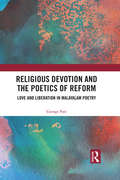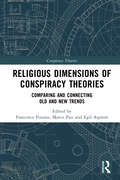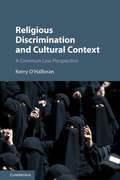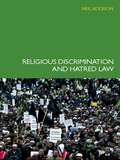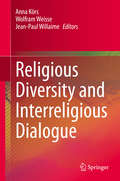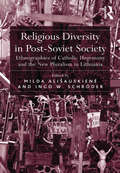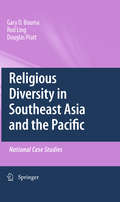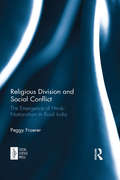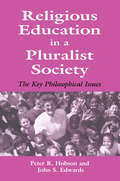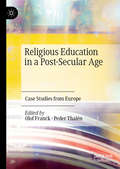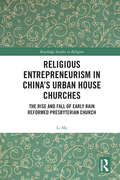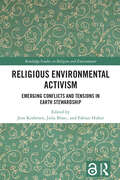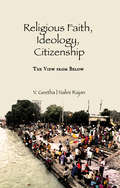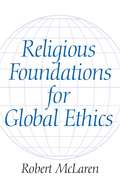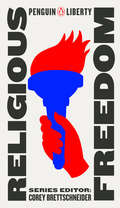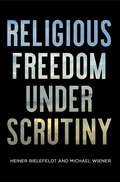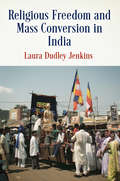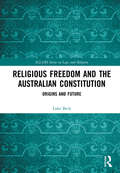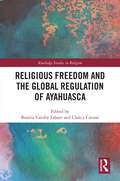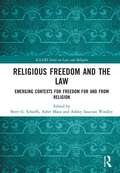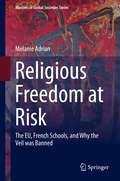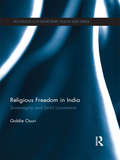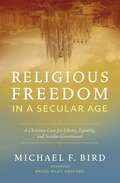- Table View
- List View
Religious Devotion and the Poetics of Reform: Love and Liberation in Malayalam Poetry
by George PatiThe poetry emanating from the bhakti tradition of devotional love in India has been both a religious expression and a form of resistance to hierarchies of caste, gender, and colonialism. Some scholars have read this art form through the lens of resistance and reform, but others have responded that imposing an interpretive framework on these poems fails to appreciate their authentic expressions of devotion. This book argues that these declarations of love and piety can simultaneously represent efforts towards emancipation at the spiritual, political, and social level. This book, through a close study of Naḷini (1911), a Malayalam lyric poem, as well as other poems, authored by Mahākavi Kumāran Āśān (1873–1924), a low-caste Kerala poet, demonstrates how Āśān employed a theme of love among humans during the modern period in Kerala that was grounded in the native South Indian bhakti understanding of love of the deity. Āśān believed that personal religious freedom comes from devotion to the deity, and that love for humans must emanate from love of the deity. In showing how devotional religious expression also served as a resistance movement, this study provides new perspective on an understudied area of the colonial period. Bringing to light an under-explored medium, in both religious and artistic terms, this book will be of great interest to scholars of religious studies, Hindu studies, and religion and literature, as well as academics with an interest in Indian culture.
Religious Dimensions of Conspiracy Theories: Comparing and Connecting Old and New Trends (Conspiracy Theories)
by Francesco Piraino Marco Pasi Egil AspremReligious Dimensions of Conspiracy Theories contributes to the study of conspiracy culture by analysing the religious and esoteric dimensions of conspiracy theories. The book examines both historical and contemporary examples to explore transnational and transhistorical continuities between religious doctrines, eschatologies, and conspiracy theories. It draws on a broad range of disciplinary insights from historians, sociologists, anthropologists, and religious studies scholars. The book has a global focus and features case studies from North America, Europe, the Middle East, Asia, and Africa. This book will be of great interest to researchers of conspiracy theories, esotericism, extremism, and religion
Religious Discrimination and Cultural Context: A Common Law Perspective
by Kerry O'HalloranGenerations of festering culture wars, compounded by actual wars in predominantly Muslim countries, the terrorism of Isis, and the ongoing migrant crisis have all combined to make religious discrimination the most pressing challenge now facing many governments. For the leading common law nations, with their shared Christian cultural heritage balanced by a growing secularism, the threat presented by this toxic mix has the potential to destabilise civil society. This book suggests that the instances of religious discrimination, as currently legally defined, are constrained by that cultural context, exacerbated by a policy of multiculturalism, and in practice, conflated with racial, ethnic or other forms of discrimination. Kerry O'Halloran argues that many culture war issues - such as those that surround the pro-choice/pro-life debate and the rights of the LGBT community - can be viewed as rooted in the same Christian morality that underpins the law relating to religious discrimination. Suggests that present forms of religious discrimination are shaped by past cultural traditions. Demonstrates how many culture war issues - such as abortion and gay marriage - are forms of religious discrimination. Provides a comparative analysis of religious discrimination case law which shows how judicial treatment of matters such as accommodating religious belief in the workplace varies on a jurisdictional basis.
Religious Discrimination and Hatred Law
by Neil AddisonDealing with this new and controversial area, this is the first comprehensive guide to religious discrimination and hatred legislation. Written by a practising barrister, experienced in all courts and tribunals, this book uses many practical examples covering all forms of religious belief. Exploring part two of the Equality Act and the Racial and Religious Hatred Act, Addison examines the fundamental differences between religion and race which make the operation of these new laws far more problematic than other racial laws. By looking at these new pieces of legislation, together with the existing Human Rights provisions of Article 9 of the European Convention on Human Rights, the 2003 Employment Discrimination Regulations and the 2001 Religiously Aggravated Offences, he is able to draw subtle comparisons and create a holistic overview of religion and the law. Challenging some common but simplistic views on the nature of religion and its accommodation in the law, this book is an essential read for students and professionals interested in human rights law and law and religion.
Religious Diversity
by Roger TriggShould we merely celebrate diversity in the sphere of religion? What of the social cohesion of a country? There is a constant tug between belief in religious truth and the need for respect for other religions. Religious Diversity: Philosophical and Political Dimensions examines how far a firm faith can allow for toleration of difference and respect the need for religious freedom. It elucidates the philosophical credentials of different approaches to truth in religion, ranging from a dogmatic fundamentalism to a pluralism that shades into relativism. Must we resort to a secularism that treats all religion as a personal and private matter, with nothing to contribute to discussions about the common good? How should law approach the issue of religious freedom? Introducing the relevance of central discussions in modern philosophy of religion, the book goes on to examine the political implications of increasing religious diversity in a democracy.
Religious Diversity and Interreligious Dialogue
by Anna Körs Wolfram Weisse Jean-Paul WillaimeThis edited volume offers solutions on the challenges of religious pluralisation from a European perspective. It gives special attention to interreligious dialogue and interfaith relations as specific means of dealing with plurality. In particular, the contributors describe innovative scientific approaches and broad political and social scopes of action for addressing the diversity of beliefs, practices, and traditions. In total, more than 25 essays bring together interdisciplinary and international research perspectives. The papers cover a wide thematic range. They highlight how religious pluralisation effects such fields as theology, politics, civil society, education, and communication/media. The contributors not only illustrate academic debates about religious diversity but they also look at the political and social scope for dealing with such. Coverage spans numerous countries, and beliefs, from Buddhism to Judaism. This book features presentations from the Herrenhausen Conference on "Religious Pluralisation - A Challenge for Modern Societies," held in Hanover, Germany, October 2016. This insightful collection will benefit students and researchers with an interest in religion and laicism, interreligious dialogue, governance of religious diversity, and religion in the public sphere.
Religious Diversity in Post-Soviet Society: Ethnographies of Catholic Hegemony and the New Pluralism in Lithuania
by Ingo W. Schröder Milda AlišauskieneSince the end of state repression against religion, two major processes have taken place in the formerly socialist countries: historically dominant churches strive to reassert their position in society, while new religious groups and ideas from various parts of the world are proliferating. This generates pluralism of religious communities and individual religious attitudes. Religious Diversity in Post-Soviet Society presents the first collection of ethnographies of this new religious diversity for Lithuania, a country that has a long history of a dominant Catholic Church. The authors reveal how Catholicism has become increasingly diversified and other religions (Charismatic Protestantism, Baltic Paganism, Eastern religions and other alternative spiritualities) are claiming their space in the religious field.
Religious Diversity in Southeast Asia and the Pacific
by Gary D. Bouma Rodney Ling Douglas PrattReligious diversity is now a social fact in most countries of the world. While reports of the impact of religious diversity on Europe and North America are reasonably well-known, the ways in which Southeast Asia and Asia Pacific are religiously diverse and the ways this diversity has been managed are not. This book addresses this lack of information about one of the largest and most diverse regions of the world. It describes the religious diversity of 27 nations, as large and complex as Indonesia and as small as Tuvalu, outlining the current issues and the basic policy approaches to religious diversity. Southeast Asia and the Pacific Islands are portrayed as a living laboratory of various religious blends, with a wide variance of histories and many different approaches to managing religious diversity. While interesting in their own right, a study of these nations provides a wealth of case studies of diversity management - most of them stories of success and inclusion.
Religious Division and Social Conflict: The Emergence of Hindu Nationalism in Rural India
by Peggy FroererThis book is an ethnographic account of the emergence of Hindu nationalism in a tribal (adivasi) community in Chhattisgarh, central India. It is argued that the successful spread of Hindu nationalism in this area is due to the involvement of the Rashtriya Swayamsevak Sangh (RSS), a militant Hindu nationalist organization, in local affairs. While active engagement in 'civilizing' strategies has enabled the RSS to legitimize its presence and endear itself to the local community, the book argues that participation in more aggressive strategies has made it possible for this organization to fuel and attach local tensions to a broader Hindu nationalist agenda.
Religious Education in a Pluralist Society: The Key Philosophical Issues
by John Edwards Peter R. HobsonReligious education in liberal pluralist societies such as the UK, the USA, and Australian underwent radical change in the 1980s and 1990s, with a major shift towards multi-faith, educationally oriented programmes. This has meant significant modifications to both the content and the methodology of religious-education courses and to the way they are conceived of and taught in schools and universities.One important implication of this change for the teaching and study of religion today is the need for a philosophical dimension that deals with issues such as the truth status of religious statements and the moral acceptability of religious claims. This dimension is often insufficiently developed; this lack is made more critical by the multiple competing truth claims of various religions, giving rise to such contentious problems as the growth of fundamentalism, increasing religious intolerance and conflict, and differences of opinion on central moral problems such as birth control, abortion and euthanasia. This text attempts to provide the philosophical underpinning that the study and teaching of religion in modern societies requires.
Religious Education in a Post-Secular Age: Case Studies from Europe
by Olof Franck Peder ThalénThis book analyzes the changes and shifts in religious education in Europe over the past 50 years. In a post-secular age, it has become increasingly difficult to make sharp distinctions between what is religious and non-religious, confessional and non-confessional. Reforms in religious education in Sweden in the 1960s appeared as part of a process of wider secular liberalization, giving more credence to the idea of absolute neutrality in religious education. However drastic shifts in society, culture and the European religious landscape raise the need for a reevaluation of the foundations of religious education. Drawing on a range of case studies from across Europe, this book will appeal to students and scholars of religious education as well as post-secular education more generally.
Religious Entrepreneurism in China’s Urban House Churches: The Rise and Fall of Early Rain Reformed Presbyterian Church (Routledge Studies in Religion)
by Li MaThis book offers a unique historical documentation of the development of the ambitious religious entrepreneurism by leaders of the Early Rain church (and later Western China Presbytery leadership), in an effort to gain social influence in China through local institution-building and global public image management. It unravels the social processes of how this Christian community with a public image of defending religious freedom in China was undermined by an internal loss of moral authority. Based on publicly available texts from Chinese social media that aren’t readily available in the West as well as in-depth interviews, it is framed by existing scholarship in social theories of the public sphere, charismatic domination in social transition, and the role of power in organizational behaviour. These churches’ stories show how Christianity, which has long been politically marginalized in communist China, has not only adapted and challenged the socio-political status quo, but how it was also ironically shaped by the political culture. This is an insightful and critical ethnographic study of one of modern China’s most famous house churches. As such, it will be of great interest to scholars of Religion in China as well as those working in Religious Studies, Asian studies, Chinese studies, and Mission Studies more generally.
Religious Environmental Activism: Emerging Conflicts and Tensions in Earth Stewardship (Routledge Studies in Religion and Environment)
by Jens Koehrsen Julia Blanc Fabian HuberThis volume explores how religious and spiritual actors engage for environmental protection and fight against climate change. Climate change and sustainability are increasingly prominent topics among religious and spiritual groups. Different faith traditions have developed "green" theologies, launched environmental protection projects and issued public statements on climate change. Against this background, academic scholarship has raised optimistic claims about the strong potentials of religions to address environmental challenges. Taking a critical stance with regard to these claims, the chapters in this volume show that religious environmentalism is an embattled terrain. Tensions are an inherent part of religious environmentalism. These do not necessarily manifest themselves in open clashes between different parties but in different actions, views, theologies, ambivalences, misunderstandings, and sometimes mistrust. Keeping below the surface, these tensions can create effective barriers for religious environmentalism. The chapters examine how tensions are manifested and dealt with through a range of empirical case studies in various world regions. Covering different religious and spiritual traditions, they reflect on intradenominational, interdenominational, interreligious, and religious-societal tensions. Thereby, this volume sheds new light on the problems that religions face when they seek to take an active role in today’s societal challenges.
Religious Faith, Ideology, Citizenship: The View from Below
by V. Geetha Nalini RajanThis book looks at the triadic relations between faith, the state and political actors, and the ideas that move them. It comprises a set of essays on diverse histories and ideas, ranging from Gandhian civic action to radical free thought in colonial India, from liberation theologies, that take their cue from specific and lived experiences of oppression and humiliation, to the universalism promised by an expansive Islam. Deploying gender and caste as the central analytical categories, these essays suggest that equality and justice rest on the strength and vitality of the exchanges between the worlds of the civic, the religious and the state, and not on their strict separation. Going beyond time-honoured dualities — between the secular and the communal (especially in the Indian context), or the secular and the pre-modern — the book joins the lively debates on secularism that have emerged in the 21st century in West, South and South-east Asia.
Religious Foundations for Global Ethics
by Robert MclarenReligious Foundations for Global Ethics is an overview of morality in a "nation of immigrants," starting with the basic question of what morality is, and culminating in an examination of morality as a source of potential conflict, and how those conflicts can be resolved peacefully. The author strives to discuss ethical concerns from a variety of religious, philosophical and psychological perspectives, so that students are able to conside issues outside of their own cultural point of view.
Religious Freedom (Penguin Liberty #5)
by Series Editor: Corey BrettschneiderTo understand the most contentious issues around religious liberty, this volume provides influential philosophical ideas from the U.S.&’s founding to the present day and key U.S. Supreme Court judgements to ask how the two twin pillars of religious freedom — free exercise and the limit on religious establishment — unfold in daily life.A Penguin ClassicWith the Penguin Liberty series by Penguin Classics, we look to the U.S. Constitution&’s text and values, as well as to American history and some of the country&’s most important thinkers, to discover the best explanations of our constitutional ideals of liberty. Through these curated anthologies of historical, political, and legal classic texts, Penguin Liberty offers everyday citizens the chance to hear the strongest defenses of these ideals, engage in constitutional interpretation, and gain new (or renewed) appreciation for the values that have long inspired the nation. Questions of liberty affect both our daily lives and our country&’s values, from what we can say to whom we can marry, how society views us to how we determine our leaders. It is Americans&’ great privilege that we live under a Constitution that both protects our liberty and allows us to debate what that liberty should mean.
Religious Freedom Under Scrutiny (Pennsylvania Studies in Human Rights)
by Heiner Bielefeldt Michael WienerFreedom of religion or belief is deeply entrenched in international human rights conventions and constitutional traditions around the world. Article 18 of the Universal Declaration of Human Rights enshrines the right to freedom of thought, conscience, and religion as does the International Covenant on Civil and Political Rights, which the United Nations General Assembly adopted in 1966. A rich jurisprudence on freedom of religion or belief is based on the European Convention on Human Rights, drafted in 1950 by the Council of Europe. Similar regional guarantees exist in the framework of the Organization of American States as well as within the African Union. Freedom of religion or belief has found recognition in numerous national constitutions, and some governments have shown a particularly strong commitment to the international promotion of this right.As Heiner Bielefeldt and Michael Wiener observe, however, freedom of religion or belief remains a source of political conflict, legal controversy, and intellectual debate. In Religious Freedom Under Scrutiny, Bielefeldt and Wiener explore various critiques leveled at this right. For example, does freedom of religion contribute to the spread of Western neoliberal values to the detriment of religious and cultural diversity? Can religious freedom serve as the entry point for antifeminist agendas within the human rights framework? Drawing on their considerable experience in the field, Bielefeldt and Wiener provide a typological overview and analysis of violations around the world that illustrate the underlying principles as well as the relationship between freedom of religion or belief and other human rights.Religious Freedom Under Scrutiny argues that without freedom of religion or belief, human rights cannot fully address our complex needs, yearnings, and vulnerabilities as human beings. Furthermore, ignoring or marginalizing freedom of religion or belief would weaken the plausibility, attractiveness, and legitimacy of the entire system of human rights.
Religious Freedom and Mass Conversion in India (Pennsylvania Studies in Human Rights)
by Laura JenkinsHinduism is the largest religion in India, encompassing roughly 80 percent of the population, while 14 percent of the population practices Islam and the remaining 6 percent adheres to other religions. <P><P>The right to "freely profess, practice, and propagate religion" in India's constitution is one of the most comprehensive articulations of the right to religious freedom. Yet from the late colonial era to the present, mass conversions to minority religions have inflamed majority-minority relations in India and complicated the exercise of this right. <P><P>In Religious Freedom and Mass Conversion in India, Laura Dudley Jenkins examines three mass conversion movements in India: among Christians in the 1930s, Dalit Buddhists in the 1950s, and Mizo Jews in the 2000s. Critics of these movements claimed mass converts were victims of overzealous proselytizers promising material benefits, but defenders insisted the converts were individuals choosing to convert for spiritual reasons. >{?>{?Jenkins traces the origins of these opposing arguments to the 1930s and 1940s, when emerging human rights frameworks and early social scientific studies of religion posited an ideal convert: an individual making a purely spiritual choice. However, she observes that India's mass conversions did not adhere to this model and therefore sparked scrutiny of mass converts' individual agency and spiritual sincerity. <P><P>Jenkins demonstrates that the preoccupation with converts' agency and sincerity has resulted in significant challenges to religious freedom. One is the proliferation of legislation limiting induced conversions. Another is the restriction of affirmative action rights of low caste people who choose to practice Islam or Christianity. Last, incendiary rumors are intentionally spread of women being converted to Islam via seduction. <P><P>Religious Freedom and Mass Conversion in India illuminates the ways in which these tactics immobilize potential converts, reinforce damaging assumptions about women, lower castes, and religious minorities, and continue to restrict religious freedom in India today.
Religious Freedom and the Australian Constitution: Origins and Future (ICLARS Series on Law and Religion)
by Luke BeckThis book examines the origins of Australia’s constitutional religious freedom provision. It explores, on the one hand, the political activities and motives of religious leaders seeking to give the Australian Constitution a religious character and, on the other, the political activities and motives of a religious minority seeking to prevent the Australian Constitution having a religious character. The book also interrogates the argument advanced at the Federal Convention in favour of section 116, dealing with separation of religion and government, and argues that until now scholars and courts have misunderstood that argument. The book casts new light to show how the origins of the provision lead to section 116 being conceptualised as a safeguard against religious intolerance on the part of the Commonwealth. Written in an accessible style, the work has potential to influence the development of constitutional doctrine by the High Court through its challenge of historical assumptions on which the High Court’s current doctrine is based. Given the ongoing political debates concerning the interaction of discrimination law and religious freedom, the book will be of interest to academics and policy-makers working in the areas of law and religion, constitutional law and comparative law.
Religious Freedom and the Constitution
by Christopher L. Eisgruber Lawrence G. SagerReligion has become a charged token in a politics of division. In disputes about faith-based social services, public money for religious schools, the Pledge of Allegiance, Ten Commandments monuments, the theory of evolution, and many other topics, angry contestation threatens to displace America's historic commitment to religious freedom. Part of the problem, the authors argue, is that constitutional analysis of religious freedom has been hobbled by the idea of "a wall of separation" between church and state. That metaphor has been understood to demand that religion be treated far better than other concerns in some contexts, and far worse in others. Sometimes it seems to insist on both contrary forms of treatment simultaneously. Missing has been concern for the fair and equal treatment of religion. In response, the authors offer an understanding of religious freedom called Equal Liberty. Equal Liberty is guided by two principles. First, no one within the reach of the Constitution ought to be devalued on account of the spiritual foundation of their commitments. Second, all persons should enjoy broad rights of free speech, personal autonomy, associative freedom, and private property. Together, these principles are generous and fair to a wide range of religious beliefs and practices. With Equal Liberty as their guide, the authors offer practical, moderate, and appealing terms for the settlement of many hot-button issues that have plunged religious freedom into controversy. Their book calls Americans back to the project of finding fair terms of cooperation for a religiously diverse people, and it offers a valuable set of tools for working toward that end.
Religious Freedom and the Global Regulation of Ayahuasca (Routledge Studies in Religion)
by Beatriz Caiuby Labate Clancy CavnarThis book offers a comprehensive view of the legal, political, and ethical challenges related to the global regulation of ayahuasca, bringing together an international and interdisciplinary group of scholars. Ayahuasca is a psychoactive brew containing DMT, which is a Schedule I substance under the United Nations Convention on Psychotropic Substances, and the legality of its ritual use has been interpreted differently throughout the world. The chapters in this volume reflect on the complex implications of the international expansion of ayahuasca, from health, spirituality, and human rights impacts on individuals, to legal and policy impacts on national governments. While freedom of religion is generally protected, this protection depends on the recognition of a religion’s legitimacy, and whether particular practices may be deemed a threat to public health, safety or morality. Through acomparative analysis of different contexts in North America, South America and Europe in which ayahuasca is consumed, the book investigates the conceptual, philosophical, and legal distinctions among the fields of shamanism, religion, and medicine. It will be particularly relevant to scholars with an interest in Indigenous religion and in religion and law.
Religious Freedom and the Law: Emerging Contexts for Freedom for and from Religion (ICLARS Series on Law and Religion)
by Brett G. Scharffs Asher Maoz Ashley Isaacson WoolleyThis volume presents a timely analysis of some of the current controversies relating to freedom for religion and freedom from religion that have dominated headlines worldwide. The collection trains the lens closely on select issues and contexts to provide detailed snapshots of the ways in which freedom for and from religion are conceptualized, protected, neglected, and negotiated in diverse situations and locations. A broad range of issues including migration, education, the public space, prisons and healthcare are discussed drawing examples from Europe, the US, Asia, Africa and South America. Including contributions from leading experts in the field, the book will be essential reading for researchers and policy-makers interested in Law and Religion.
Religious Freedom at Risk
by Melanie AdrianThis book examines matters of religious freedom in Europe, considers the work of the European Court of Human Rights in this area, explores issues of multiculturalism and secularism in France, of women in Islam, and of Muslims in the West. The work presents legal analysis and ethnographic fieldwork, focusing on concepts such as laïcité, submission, equality and the role of the state in public education, amongst others. Through this book, the reader can visit inside a French public school located in a low-income neighborhood just south of Paris and learn about the complex dynamics that led up to the passing of the 2004 law banning Muslim headscarves. The chapters bring to light the actors and cultures within the school that set the stage for the passing of the law and the political philosophy that supports it. School culture and philosophy are compared and contrasted to the thoughts and opinions of the teachers, administrators and students to gage how religious freedom and identity are understood. The book goes on to explore the issue of religious freedom at the European Court of Human Rights. The author argues that the right to religious freedom has been too narrowly understood and is being fenced in by static visions of Islam. This jeopardizes the idea of religious freedom more broadly. By becoming entangled with regional and domestic politics, the Court is neglecting important nuances and is jeopardizing secularism, pluralism and democracy. This is a highly readable and accessible book that will appeal to students and scholars of law, anthropology, religious studies and philosophy of religion.
Religious Freedom in India: Sovereignty and (Anti) Conversion (Routledge Contemporary South Asia Series)
by Goldie OsuriDrawing on the critical and theoretical concepts of sovereignty, biopolitics, and necropolitics, this book examines how a normative liberal and secular understanding of India’s religious identity is translatable by Hindu nationalists into discrimination and violence against minoritized religious communities. Extending these concepts to an analysis of historical, political and legal genealogies of conversion, the author demonstrates how a concern for sovereignty links past and present anti-conversion campaigns and laws. The book illustrates how sovereignty informs the making of secularism as well as religious difference. The focus on sovereignty sheds light on the manner in which religious difference becomes a point of reference for the religio-secular idioms of Bombay cinema, for legal judgements on communal violence, for human rights organizations, and those seeking justice for communal violence. This wide-ranging examination and discussion of the trajectories of (anti) conversion politics through historical, legal, philosophical, popular cultural, archival and ethnographic material offers a cogent argument for shifting the stakes and rethinking the relationship between sovereignty and religious freedom. The book is a timely contribution to broader theoretical and political discussions of (post) secularism and human rights, and is of interest to students and scholars of postcolonial studies, cultural studies, law, and religious studies.
Religious Freedom in a Secular Age: A Christian Case for Liberty, Equality, and Secular Government
by Michael F. BirdDiscover how to responsibly defend religious freedom for all without compromising your personal beliefs.Religious freedom is a bitterly contested issue that spills over into political, public, and online spheres. It's an issue that's becoming ever more heated, and neither of the global political polarities is interested in protecting it. While the political left is openly hostile toward traditional religion, the political right seeks to weaponize it.How can we ensure that "religious freedom" is truly about freedom of one's religion rather than serving an ethno-nationalist agenda?In Religious Freedom in a Secular Age, Michael Bird (New Testament scholar and author of Evangelical Theology) has four main goals:To explain the true nature of secularism and help us to see it as one of the best ways of promoting liberty and mutual respect in a multifaith world.To dismantle the arguments for limiting religious freedom.To outline a biblical strategy for maintaining a Christian witness in a post-Christian society.To encourage Christians to participate in a new age of apologetics by being prepared to defend not only their own believes but also the freedom of all faiths.While Bird does address the recent political administrations in the US, his focus is global. Bird—who lives in Melbourne, Australia—freely admits to his anxiety of the militant secularism surrounding him, but he also strongly critiques the marriage of national and religious identities that has gained ground in countries like Hungary and Poland.The fact is that religion has a lot to contribute to the common good. Religious Freedom in a Secular Age will challenge readers of all backgrounds and beliefs not only to make room for peaceable difference, but also to find common ground on the values of justice, mercy, and equality.
